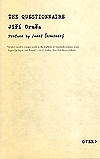THE QUESTIONNAIRE
 In this vision, a faceless woman takes him
up in an elevator to a pharmacy full of bottles and glasses:
In this vision, a faceless woman takes him
up in an elevator to a pharmacy full of bottles and glasses:
-
"The bottles had labels in Latin and Greek, yet for all their high-flown
names they were quite common drugs, at least according to the woman
(still faceless), busily pouring and decanting, until at last she
reached for a green fluorescent vial full of deep-green liquid labeled
Pharmakon athanasias. But as she was about to pour me some of this
elixir of immortality I shouted and begged her to stop, because inside
the vial there was another me, in the shape of a homunculus. But the
woman continued to drain me of fluid until I felt myself gasping like a
fish, suffocating."
Jan's life revolves around the Czech town of Chlumec and wanders back through generations and among his relatives creating a myth about the black eyes which have been passed down the women of his family. His story shifts kaleidoscopically blurring eras and blending ancestors with living figures, and living figures with fabulous creatures. The only books I'd compare it to are also so idiosyncratic as to defy comparison: Tristram Shandy or The Book of the Khazars or The Tin Drum. In any case, the comparisons miss the alchemical oddness of this novel which, like Rabbi of Prague, brings dead forms to life with a word.
Although it originally came out in 1982, and first came to notice as part of the Eastern European samizdat literature, The Questionnaire hasn't lost any relevance with the collapse of Communism. It serves nobody's didactic purposes, and for that matter, it just plain won't serve.



